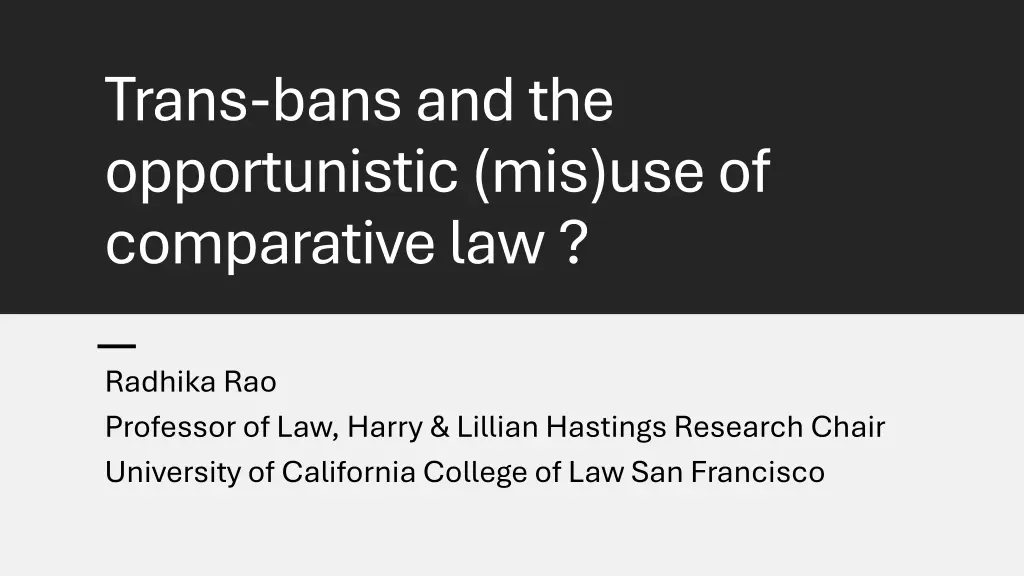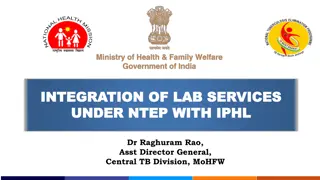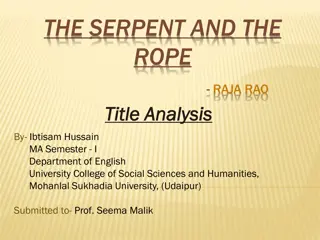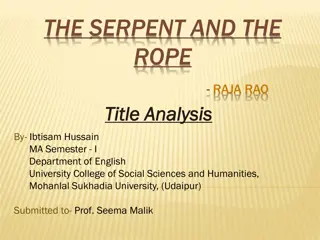
Challenging Transgender Youth Gender-Affirming Care Bans: Legal Analysis
Explore the legal challenges surrounding transgender youth gender-affirming care bans in the United States. Discover the impact, constitutional issues, and court rulings shaping this contentious issue affecting minors seeking medical treatments for gender dysphoria.
Download Presentation

Please find below an Image/Link to download the presentation.
The content on the website is provided AS IS for your information and personal use only. It may not be sold, licensed, or shared on other websites without obtaining consent from the author. If you encounter any issues during the download, it is possible that the publisher has removed the file from their server.
You are allowed to download the files provided on this website for personal or commercial use, subject to the condition that they are used lawfully. All files are the property of their respective owners.
The content on the website is provided AS IS for your information and personal use only. It may not be sold, licensed, or shared on other websites without obtaining consent from the author.
E N D
Presentation Transcript
Trans-bans and the opportunistic (mis)use of comparative law ? Radhika Rao Professor of Law, Harry & Lillian Hastings Research Chair University of California College of Law San Francisco
Trans-bans in the United States Since 2021, 26 states have enacted laws banning gender-affirming medical care for minors under the age of 18 years. Some of these laws impose criminal penalties upon physicians (six states classify provision of care as a felony) or target the parents for investigation for child abuse! The Supreme Court is currently considering a case that challenges the constitutionality of two such laws, in Tennessee and Kentucky. On Tuesday June 3, 2025, Human Rights Watch issued a 98-page report titled They re ruining people s lives : bans on gender-affirming care for transgender youth in the US, which documents the devastating consequences of these bans, including increased anxiety, depression, and suicide attempts (in seven reported instances).
L.W. (by and through her parents) v. Skrmetti (6thCircuit 2023) The case currently before the Supreme Court involves a Tennessee law prohibiting the use of puberty-blockers, hormones, and surgery to treat gender dysphoria, which is a medical condition involving distress from a discordance between a person s perceived gender and their biological sex The law prohibits the use of such medical treatments only for minors who are seeking to identify or live with an identity that is inconsistent with their biological sex The law contains an exception that explicitly permits the use of puberty blockers and hormones to treat minors with congenital conditions, precocious puberty, disease, or physical injury
L.W. v. Skrmettiat the district court The district court ruled that the challengers lacked standing to challenge the ban on surgeries But the court concluded that the ban on hormones and puberty blockers was unconstitutional under the Due Process and Equal Protection Clauses of the 14thAmendment: The court found that the Tennessee law infringes on the parent s fundamental right to direct the medical care of their children and that the law improperly discriminates on the basis of sex and transgender status (which should also be a quasi-suspect class) and that the law cannot withstand heightened scrutiny
L.W. v. Skrmettiat the Court of Appeals The Court of Appeals reversed, by a 2-1 vote: Concluding that the law does not violate the Due Process Clause because this country does not have a deeply rooted tradition of preventing governments from regulating the medical profession in general or certain treatments in particular, whether for adults or their children. And ruling that the law does not discriminate based upon sex but rather distinguishes between different medical treatments because using testosterone or estrogen to treat gender dysphoria (to transition from one sex to another) is a different procedure from using testosterone or estrogen to treat Kleinfelter Syndrome or Turner Syndrome (to address a genetic or congenital condition that occurs exclusively in one sex). The court cited Geduldig and Dobbs for the proposition that a law which regulates a medical procedure that only one sex can undergo does not trigger heightened scrutiny as a sex-based classification under the Equal Protection Clause.
L.W. v. Skrmettiat the Supreme Court In 2024, the Supreme Court granted cert to determine the constitutionality of the Tennessee and Kentucky laws. In its brief before the Supreme Court, Tennessee points to the experience of other countries in support of its law, asserting: Systematic reviews by national health authorities in Sweden, the United Kingdom, Finland, and Norway have all concluded that the harms associated with these interventions are significant, and the long-term benefits are unproven. Some of the same European countries that pioneered these treatments now express caution about them and have pulled back on their use.
The UK experience: the Tavistock case In 2019, a lawsuit was filed against the Tavistock Clinic, the only gender identity clinic for children and young people in the UK. The plaintiff, Keira Bell, received puberty blockers at age 16, testosterone at age 17, and underwent a double mastectomy at age 20. She then detransitioned by age 23, claiming she regretted her decision and should not have been allowed to undergo such treatment at her age. The UK High Court (equivalent to a federal district court) ruled that minors under age 16 do not have the competency to fully understand the implications of puberty-blocking therapy and thus could not consent. The court also held that minors between the ages of 16 and 18 do possess the competence to legally consent, but that a physician must obtain court approval prior to prescribing puberty blockers. But in 2021, the UK Court of Appeal overturned this decision, ruling that the High Court should not have issued guidance on cases involving younger children, since the case did not raise these issues. And, in a separate case (AB v. CD and others), the UK Court of Appeal also overruled the portion of the original opinion requiring court approval for the prescription of puberty blockers, holding that doctors rather than courts should make these decisions. Yet the Tavistock case did not result in a ban on the use of puberty blockers, but instead illustrates the risk of overzealous treatment and rogue medics. The Clinic officially closed in 2024, but NHS England replaced it with two regional centers offering more holistic care, including psychotherapy.
The UK experience: the Cass Report In 2020, around the same time the Tavistock case was playing out, the National Health Service England commissioned Dr. Hilary Cass to formally review the healthcare options prescribed to minors seeking gender identity treatment. The Cass report suggested that there is only weak evidence that puberty-blocking hormones help patients with gender dysphoria, and that these medications carry many potential side effects that could be harmful to patients. Thus, the report recommended that NHS ban the routine prescription of puberty-blockers to patients under age 18 unless the patient is participating in a clinical trial. In 2024, after publication of the Cass Report, the NHS immediately halted the prescription of puberty- blockers to minors under age 18. In May 2024, the UK govt extended this approach to private providers, announcing an emergency ban on the prescription of puberty-blockers by private prescribers in the UK. This ban was extended twice until it was made indefinite in December 2024; it won t be reviewed again until 2027. But the UK ban does not restrict the continued provision of care to patients already receiving treatment, and it allows doctors to prescribe puberty-blockers to minors in exceptional circumstances on a case-by-case basis. In addition, the NHS has begun developing clinical trials with the National Institute of Health and Care Research (NIHR), moving towards an evidence-based medical model, rather than a punitive model.
For Women Scotland v. the Scottish Ministers (UK Supreme Court 2025) On April 16th, 2025, the UK Supreme Court unanimously ruled that the terms woman and sex refer to a biological woman and biological sex for purposes of the Equality Act, which governs discrimination in every area of public life, including employment, education, and public services. The Court also stated that the definition of sex under the Equality Act makes clear that the concept of sex is binary. This means that trans-women with a Gender Recognition Certificate (which allows persons to be permanently legally recognized as the opposite sex if they have been diagnosed with gender dysphoria by two doctors and if they have lived in their acquired gender for two years) cannot be considered women for purposes of the Equality Act.
What about Sweden? Sweden was the first country in the world to allow people to legally change their gender in 1972. By the early 2000 s, Sweden offered gender-affirming hormone therapy and surgery through its universal healthcare system, based on internationally recognized guidelines established by the World Professional Association for Transgender Health (WPATH). But in 2022, Sweden s National Board of Health and Welfare issued a report titled Care of Children and Adolescents with Gender Dysphoria, which reversed previous practice by recommending that puberty- blockers and hormones be provided to minors only in research settings, based upon insufficient long-term evidence and concerns about irreversible side effects.
What about Finland? Finland s gender identity services had historically followed WPATH guidelines, as well. But in June 2020, the Finnish Council for Choices in Health Care issued a new recommendation limiting gender-affirming medical interventions for minors to clinical trial settings, citing precautionary principles. The decision also emphasized psychosocial interventions as the first- line approach, instead of medical treatments.
Do these examples support the trans-bans? At one level, the experience in the UK and these other countries does suggest a retrenchment from the prescription of puberty-blockers and hormone therapy for minors, based upon the lack of evidence of success and the potential harms associated with irreversible side-effects. On the other hand, none of these countries have enacted criminal prohibitions; instead, all of them have limited the use of gender-affirming medical care to clinical or research settings, with exceptions for continuity of care and other extenuating circumstances. Thus, all of them exemplify an evidence-based medical model, rather than a prohibitory or punitive approach. They also highlight broader questions about the opportunistic (mis)use of comparative constitutional law???
Controversy over consideration of comparative constitutional law In Lawrence v. Texas (2003), Justice Kennedy s opinion for the Court invoked the experience of other countries in its holding that laws criminalizing same-sex sodomy are unconstitutional. Yet Justice Scalia s dissent in Lawrence decried the use of comparative constitutional law, stating: The Court s discussion of these foreign views (ignoring, of course, the many countries that have retained criminal prohibitions on sodomy) is meaningless dicta. Dangerous dicta, however, since this Court should not impose foreign moods, fads, or fashions on Americans. (quoting from Justice Thomas s dissent from the denial of cert in Foster v. Florida, 537 US 990 (2002)).
Opportunistic (mis)use of foreign law? In the past, conservatives have decried the use of comparative constitutional law, not only in Lawrence v. Texas, but also in the death penalty context, in cases such as Atkins and Roper. In 2005, Justices Ginsburg and O Connor received death threats for their citations of comparative constitutional law! And Congressional conservatives even considered enacting legislation that would make it illegal to cite foreign law! But now, conservatives are drawing upon these foreign examples to support the constitutionality of trans-bans.






















